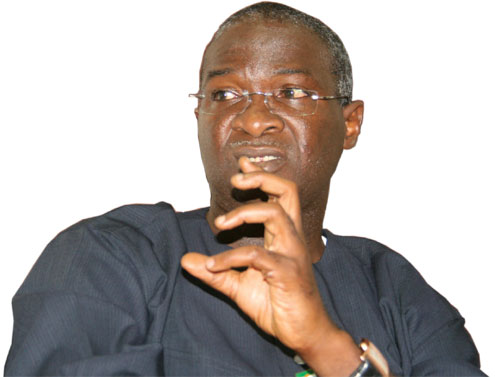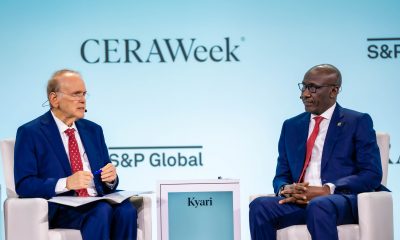Editorial Opinion
Brothers and Sisters, we need to ask Fashola for a power policy
Published
9 years agoon
By
Olu Emmanuel
By Sowunmi Olabode Jr
I think it’s pertinent to start with a positive in a new year. It’s one of the habits of successful people to look at issues in the positive light. Things of value can only be built on a positive.
Men of success speak in certain ways and its always positive ways. Our energy industry is broken down into two or three key aspects, the Oil & Gas sector, The Power sector and Renewable energy. The latter hanging somewhere without someone being responsible for nurturing and full development. Aspects of Renewable energy development exist with NNPC, some aspects with the Ministry of Power and others with the Energy Commission of Nigeria and those agencies don’t necessarily have a history of working together.
In simple terms, an Energy policy can be defined as the manner in which a given entity (usually government) has decided to address issues such as energy consumption, energy production & distribution. The policy will also look into issues such as legislation, International treaties, incentives to investment, taxation, guidelines for conservation and other public issues germane to the local milieu.
It will be recalled that a few weeks ago, the Minister of Power, Works & Housing attended a public hearing on the activities of NERC. He was required to make a presentation to the House committee on Power under the chairmanship of Honourable Daniel Asuquo. He had a relatively private session to answer his questions for he had earlier made an appearance before the august body requesting an extra week to make his presentations owing to the nascence of his appointment. The house had agreed. During the interaction, some of his answers were inconclusive. The minister himself asked greater questions and painted a number of chicken-egg situations. They showed a thinking man but did not offer much in terms of solutions. It should be understood that the minister should provide answers and not ask questions. The man on the street irrespective of party affiliations is in need of solutions. Period!
Effective governance is not about the omniscient manager. It is not about the superstar administrator. No sir. It is about a working system. It is about the person who can twerk the system to making a working one. The energy system of Nigeria from the judicial implantation of the laws, the legislative oversight, the competence with which the agencies responsible for implementation governmental methods do their work. It is about how much excitement they are able to generate from the private sector. It is about how much the media is made to be a part of the industry so that they can effectively research the industry and subsequently report it better. When the reportage of the industry is good, then the discussions in the public space will be of better quality, then the expectations of Nigerians will be more realistic and our power sector players will be guided by realistic and knowledgeable power sector expectations from the Nigerian people. All of these should come from the power policy.
A way to get the ingredients for this kind of policy is an all-inclusive stakeholder’s meeting, preferable a retreat. A market place interaction that will ensure a cross pollination of ideas among government and private sector participants. It will also include civil society, the media, quasi-government organisations, the financial sector, the energy related multinational organisations, aspiring entrepreneurs, software solution providers of the industry, the legislators, the judiciary and of course the Ministry. It should be a who-is-who in the power sector kind of gathering. In such a meeting all concerns will be received first-hand. The challenges will be spelt out live. The options for progress will be x-rayed and the interest of all adjusted into reality. If this kind of conference is executed properly, its report can serve as the foundation for an energy policy. A document the nation is in desperate need of.
What makes such a policy significant is that its value and relevance is in the backing of the law and its protagonists are the executives. According to an American academic journal, the US national energy policy comprises a set of measures involving the countries laws, treaties and agency directives.
What would this energy policy achieve and what questions will it answer? Am glad you asked!
1) What is the extent of energy self-sufficiency for this nation?
2) How do we create appropriate independent sources for generating data, information & knowledge?
3) What are the steps to help the media to increase competence and to encourage the market research companies to investigate the sector?
4) What fraction of the nation is enduring energy poverty and how does the budget hope to tackle these issues?
5) What are the reliability standard for distribution reliability.
6) How will energy efficient hardware (e.g hybrid vehicles, other appliances) be encouraged?
7) What are the latest in terms of dynamics, policy mechanisms, etc (taxes, incentives, manufacturing standards, etc) set in place to ensure the success of the policy as a whole?
8) How does this policy help to ensure a regional, state & LGA have their own policy?
A peep into the benefits of the policy in some other nations.
THE UNITED KINGDOM:
The Energy policy of the UK can rightfully be regarded as the UK bible in terms of all issues that relates to energy in the UK and her relationship with the world.The energy policy of the UK has achieved success in a) Reducing Energy intensity 2) reducing energy poverty & C) maintaining energy supply reliability to date. It has one flaw though, it does not address Energy self-sufficiency for the UK.
INDIA:
The energy policy of India as analysed by some leading research companies is characterised by trades between four major drivers:
A) Rapidly growing economy with a need for reliable electricity.
B) Increasing household incomes with a need for affordable & adequate supply of electricity.
C) Limited domestic reserves of fossil fuels and the need to import.
D) Indoor, urban & regional environmental impacts, creating the need for cleaner fuels and even cleaner technologies.
BRAZIL:
Power sector reforms were initiated in the mid-1990 and a new regulatory framework was applied in 2004. In that year, the generation capacity of the country was 86.5 GW. Its policies ensured that 66% of distribution and 28% of power generation is owned by private companies. We also learnt from Brazil’s energy policy that 50% of her total Photovoltaic power capacity (about 15MW) is used for telecommunication systems and the other 50% for the rural energy.
The issues varies from nation to nation and each environmental peculiarity is taken into cognisance. However it is what we need. That is why we ask Minister Fashola, where is our energy policy for the power sector? Always remember energy is the most important commodity. Period!
● Olabode is an Energy Consultant
You may like


UniAbuja gets new Acting Vice Chancellor


Bridging energy access gap vital for Nigeria’s economic growth, says NNPC Chief


NNPCL denies adjustment in price of fuel, diesel


NNPC Ltd will use gas to trigger Nigeria’s Industrialisation, Economic Devt. -Eyesan


Kyari calls for differentiated energy transition for Africa


NNPCL solicits EFCC’s support in fight against crude oil theft
Trending

 Comments and Issues2 days ago
Comments and Issues2 days agoAs Ariwoola takes the judiciary to the top of the grease pole

 Business6 days ago
Business6 days agoNMDPRA Chief faces backlash over comment on Dangote Refinery

 Business1 week ago
Business1 week agoGlobal cyber outage disrupts flights, Banks, telecoms, Media

 Business1 week ago
Business1 week agoKPMG criticizes FG’s 50% windfall tax, foresees legal disputes

 Business5 days ago
Business5 days agoZenith Bank retains position as Nigeria’s Tier-1 capital leader

 News6 days ago
News6 days agoPhilip Shaibu officially joins APC, dumps PDP

 Comments and Issues5 days ago
Comments and Issues5 days agoOnanuga and the Surprise from Joe Igbokwe

 Education7 days ago
Education7 days agoJAMB reacts to allege age limit by ministry of education



